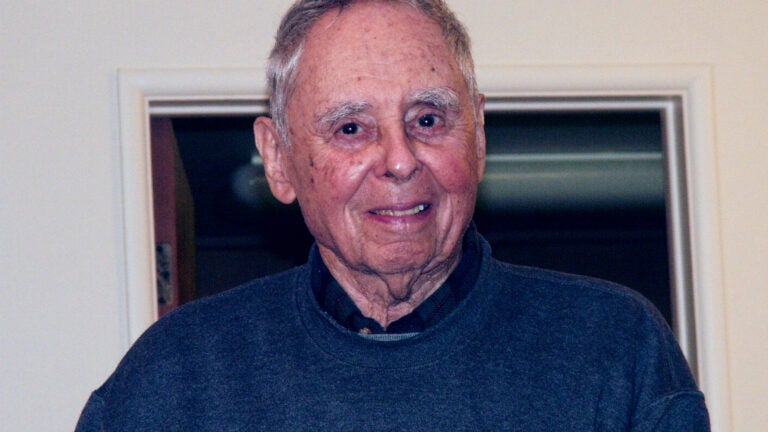
In Memoriam: John R. Schmidhauser
The aspiring assistant professor went to USC Dornsife in the spring of 1987 for a job interview.
The first person she met was a collegial gentleman who gave her a warm welcome and then showed her around the impressive campus.
Alison Dundes Renteln, now a professor of political science, anthropology, public policy and law, certainly knew who the man was: John R. Schmidhauser, chair of the Political Science Department and one of the nation’s leading scholars in the area of judicial politics.
He also was a former U.S. congressman.
Having studied the seminal works of the internationally known Schmidhauser, Renteln appreciated the fact that a scholar of his stature would take a genuine interest in her opinions about politics and academia, her background, and her career aspirations.
But that was vintage Schmidhauser, who never lost his gift for the human touch — as a mentor, leader, family man and a former petty officer in the U.S. Navy who served during World War II.
“He was a perfect gentleman who made everyone feel that his or her view mattered,” Renteln said.
Schmidhauser was 96 when he died Feb. 21 in Santa Barbara.

John Schmidhauser in 2008.
For years, he and his family lived in Carpinteria, the small oceanside city in Santa Barbara County.
Schmidhauser leaves behind seven children, his wife of 66 years, Thelma, 92, five grandchildren, one great grandchild and a legacy scholars say will forever loom large.
“He was a pioneer in the field of judicial behavior,” said Joel Grossman, one of Schmidhauser’s first Ph.D. students when Schmidhauser taught at the University of Iowa before coming to USC in 1973.
Grossman, now a professor of political science emeritus and academy professor at Johns Hopkins University, said one of Schmidhauser’s numerous books, “The Supreme Court: Its Politics, Personalities and Procedures” (Holt, Rinehart and Winston,1960), set new standards for both teaching and research about the Supreme Court.
“His constitutional law casebook, among the first of its kind, encouraged students to consider how the court made its decisions as a way of understanding the meaning and impact of its formal opinions,” Grossman added.
Said Jeb Barnes, professor of political science at USC Dornsife: “He was amajor architect of the field of judicial behavior and was a model social scientist. He was decades ahead of his time.”
A humble statesman
Schmidhauser was born in the Bronx, New York.
He lost his father when he was a teenager and spent the Great Depression living lean with his mother in Salisbury, Md., an experience that shaped his work ethic and engendered in him an empathy for society’s marginalized and a lifelong support for issues related to social justice.
Schmidhauser served in the U.S. Navy from 1941–45. After World War II, he enrolled in college under the GI Bill and went on to earn a bachelor’s degree from the University of Delaware and a master’s degree and a doctorate from the University of Virginia, all in political science.
From 1954–73, Schmidhauser served as a professor at the University of Iowa, not counting some leave of absences and his two-year career in Congress. While at the University of Iowa, he produced groundbreaking scholarly work on the U.S. Supreme Court.
While serving as a volunteer precinct captain for the Iowa City Democratic Committee, Schmidhauser agreed to run for a seat in the U.S. Congress. He scored an upset victory in the 1964 General Election in Republican-heavy First District of Iowa.
“He was a statesman way ahead of his time, especially in the field of protecting our environment,” said Bill Gluba, who worked on Schmidhauser’s successful campaign for Congress. “He was warning those who would listen about climate change before the phrase was even coined.”
Schmidhauser served a two-year term in Congress that ended in January 1967, after which he returned to academe at the University of Iowa.
In 1973, he began his illustrious 19-year career as chair of the Political Science Department a USC, winning in 1991 the USC Raubenheimer Outstanding Senior Faculty Award. That year, he also received the Golden Key award for comparative research.
Schmidhauser’s warm demeanor made it easy for his graduate students to follow him around after class as he walked to his car to drive home. It was common to see them talking to him as he drove off with the window down, eager to glean any last pearls of wisdom from him.
After retiring from USC in 1992, Schmidhauser taught political science for several years at the University of California, Santa Barbara. In his later years, he remained active in local causes, writing editorials for the local newspaper and fighting to preserve Carpinteria’s coastal bluffs.
For Renteln and scores of his other former colleagues and students at USC, Schmidhauser was a true star.
“He was a charismatic and brilliant leader, and a great colleague and great mentor,” she said. “He was just a gem.”